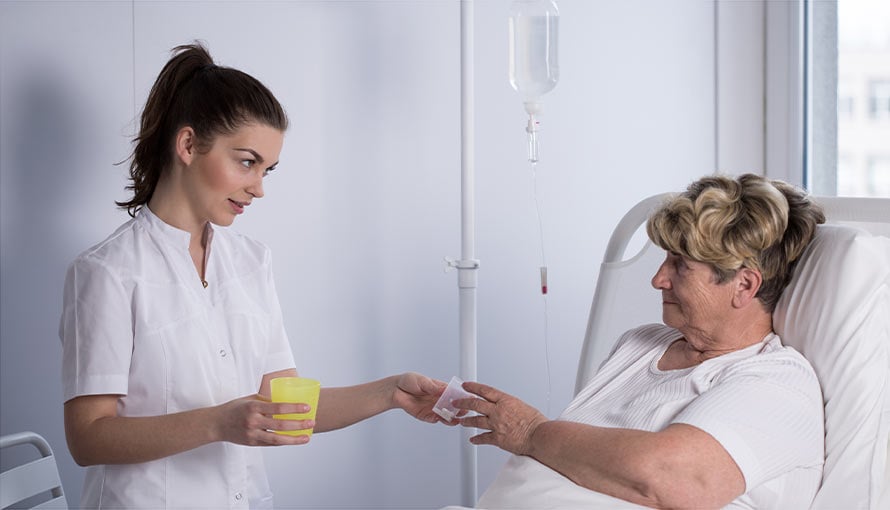Chemotherapy for Pancoast Tumors

A Pancoast tumor is a rare type of cancer that develops in the upper part of the lung (apex). Due to their unique location, Pancoast tumors do not usually cause chest pain, coughing or other symptoms commonly associated with lung cancer. Instead, the most typical sign is shoulder pain with arm weakness, similar to a pinched nerve.
The best treatment approach for a Pancoast tumor can vary based on the precise location and extent of the cancer. One option is chemotherapy, a systemic treatment that uses powerful medications to fight cancer that has spread. After being administered intravenously or orally, the drugs enter the bloodstream and circulate throughout the body to reach and destroy rapidly dividing cells, such as Pancoast tumor cells.
Chemotherapy before surgery
When possible, surgical removal is the preferred treatment approach for a Pancoast tumor. In many cases, a combined regimen of chemotherapy and radiation therapy (chemoradiation) is administered prior to surgery to shrink the tumor and make it easier to remove.
Chemotherapy as a standalone treatment
Because Pancoast tumors do not usually cause classic lung cancer symptoms, there may be a delay in their detection. A diagnosis is often not confirmed until the cancer has reached a locally advanced stage. A tumor that has invaded the chest wall or wrapped around blood vessels or nerves would likely be challenging or impossible to remove.
If surgical removal of a Pancoast tumor is not advisable, chemotherapy may be considered as a standalone treatment. In addition to eliminating the cancer, chemo can slow the growth of the tumor and reduce the resulting pressure on the lungs, making it easier for the patient to breathe.
What to expect with chemotherapy
Chemotherapy is usually administered in cycles. The medications are given over several days or weeks followed by a short break to allow the patient’s body time to recover.
Certain chemotherapy medications can be swallowed in pill or capsule form, while others are injected into a vein. Depending on the specific prescription, the treatment may take place in a hospital, in an infusion center or at home.
Several different chemotherapy medications may be prescribed to treat a Pancoast tumor. The most common include:
- Cisplatin
- Etoposide
- Paclitaxel
Depending on the genetic makeup of the tumor, the patient’s age and other factors, the chemotherapy prescription may include a combination of medications or just one.
During chemotherapy, the patient is closely monitored and the treatment plan is continually refined or adjusted as needed. For instance, if the tumor is not shrinking, the medical oncologist may suggest a different medication. Or, if the patient experiences disruptive side effects, the medical oncologist may lower the dose of the current medication, prescribe an additional medication or recommend a different prescription altogether.
Side effects of chemotherapy
Because chemotherapy targets and destroys rapidly dividing cells, it can be effective in treating Pancoast tumors. However, certain healthy cells throughout the body normally reproduce at a very rapid rate. Examples include the cells that line the mouth and intestines and the cells in the hair follicles. Because chemotherapy medications cannot distinguish between fast-growing healthy cells and fast-growing cancer cells, some healthy cells may be damaged during treatment. This can lead to side effects.
Chemotherapy side effects can vary based on the drug or drug combination used. In general, some patients experience:
- Hair loss
- Mouth sores
- Stomach pain
- Headaches
- Muscle pain
- Numbness or burning sensations in their fingers or toes
Supportive care options, such as anti-nausea medications, can help counteract the side effects of chemotherapy.
Benefit from world-class care at Moffitt Cancer Center
Moffitt’s renowned Thoracic Oncology Program is home to a team of highly experienced medical oncologists who specialize in treating Pancoast tumors with chemotherapy. To help each patient achieve the best possible outcome and quality of life, these seasoned experts take into account many individual factors when developing treatment plans. In addition to the genetic makeup of the cancer cells, our team assesses the size, stage and location of the Pancoast tumor to determine which chemotherapy medications would likely produce the most favorable response.
Through Moffitt’s robust portfolio of clinical trials, our patients have access to promising new chemotherapy drugs for Pancoast tumors before those options are made available in other settings. Other treatment options, along with a full range of supportive care services, are available in the same convenient location.
If you have questions about chemotherapy for Pancoast tumors, you do not need a referral to talk with a specialist at Moffitt. Request an appointment by calling 1-888-663-3488 or submitting anew patient registration form online.
Treatment
